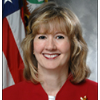In 1940, the Treasury Department established the Fiscal Service, which consisted of the Bureau of Accounts, the Bureau of the Public Debt and the Office of the Treasurer. A 1974 reorganization of the Fiscal Service created the Bureau of Government Financial Operations, which was formed from a merger of the Bureau of Accounts and most functions of the Office of the Treasurer. In 1984, the Bureau of Government Financial Operations was renamed the Financial Management Service (FMS); the new name was meant to reflect Treasury’s renewed emphasis on achieving greater efficiency and economy in government financial management.
Through its Electronic Money (E-Money) Program, FMS tests new payment and collection technologies using the Internet and card technology, as well as related technologies such as digital signatures and biometrics. FMS has several programs to help federal agencies modernize their payment and collection activities, including: government-wide collections portal;
used on military bases and in government hospitals; point-of-sale check truncation; and an Internet credit card collection program. Since October 2000, FMS has collected monies through a federal Internet portal called
. Pay.gov provides collections, form submittal and bill presentment, authentication, and agency financial reporting services. Pay.gov, which has been implemented with 85 federal agencies representing 208 cashflows, collected $37.9 billion in FY 2007.
|
IBM
|
$55,795,375
|
|
M-Cubed Information Systems
|
$31,286,514
|
|
Computer Sciences Corporation
|
$30,233,430
|
|
STG, Inc.
|
$27,991,080
|
|
Onpoint Consulting Inc.
|
$27,103,971
|
|
Pante' Technology Corporation
|
$21,203,271
|
|
Avineon, Inc.
|
$18,722,309
|
|
SAIC, Inc.
|
$17,272,538
|
|
Integrated Solutions
|
$16,375,942
|
FMS Significant Weaknesses in Computer Controls Continue
(GAO Report) (PDF)
- fully implement an effective security program
- correct each individual weakness that GAO identified and address each of the 85 specific recommendations detailed in the December 14, 2001, report
- work with the Federal Reserve Banks (FRBs) to monitor corrective actions taken to resolve the computer control vulnerabilities related to FMS systems supported by the FRBs that GAO identified and communicated to the FRBs
- develop a detailed plan that describes the remedial actions, resources, target dates, and responsible agency officials to facilitate the implementation of its security program.
- FMS Significant Weaknesses in Computer Controls Continue (GAO Report) (PDF)
- Table of Contents
- Overview
- History
- What it Does
- Where Does the Money Go
- Controversies
- Suggested Reforms
- Comments
- Leave a comment


On June 30, 2014, Sheryl R. Morrow began serving as the commissioner of the Bureau of the Fiscal Service (Fiscal Service). Located in the Department of the Treasury, the Fiscal Service replaced the Bureau of the Public Debt and the Financial Management Service (FMS), which were consolidated into it, effective October 7, 2012. The Bureau manages the government’s accounting, central payment systems, and public debt programs.
Born circa 1956 to John S. Rickard and Valerie (Martins), Morrow has two sisters and a brother. She earned a B.S. degree in business administration, majoring in accounting and economics, at George Mason University in 1978.
That same year, Morrow began her government career with the Department of the Army. She moved to the U.S. Customs Service in 1980, serving as an accountant in both positions. She joined FMS in 1983 and has held a variety of jobs during her 34 years there.
From July 2007 to January 2010, Morrow served as the assistant commissioner of federal finance at FMS, where she was responsible for managing nearly $3.2 trillion in annual federal revenue collections.
From 2010 to late 2012, Morrow served as the assistant commissioner of payment management and was the chief disbursing officer at FMS, responsible for disbursing more than 1.2 billion payments each year, including tax refunds and Social Security, veterans’ benefits, railroad retirement, and civil service retirement payments.
From December 2012 to June 2014, Morrow served as the deputy assistant secretary for fiscal operations and policy at Treasury, where she provided day-to-day support to the fiscal assistant secretary.
Sheryl Morrow lives in Dumfries, Virginia, with her husband, Mark. The couple has two sons, Mark and John.
-Matt Bewig
To Learn More:

David A. Lebryk was selected as commissioner of the U.S. Department of the Treasury’s Financial Management Service (FMS) on June 26, 2009.
- Latest News
- D.C. Public Schools will Teach all Second-Graders to Ride a Bike
- New Rule in Germany Limits Sales of Sex-Themed E-Books to 10pm to 6am
- What Happened to the 6-Year-Old Tibetan Boy the Chinese Government Kidnapped 20 Years Ago?
- U.S. Ambassador to Turkey Photoshops his Hair Color to Mock Turkish Mayor
- Mystery Artist Calls Attention to Unfixed Potholes by Drawing Penises around Them
In 1940, the Treasury Department established the Fiscal Service, which consisted of the Bureau of Accounts, the Bureau of the Public Debt and the Office of the Treasurer. A 1974 reorganization of the Fiscal Service created the Bureau of Government Financial Operations, which was formed from a merger of the Bureau of Accounts and most functions of the Office of the Treasurer. In 1984, the Bureau of Government Financial Operations was renamed the Financial Management Service (FMS); the new name was meant to reflect Treasury’s renewed emphasis on achieving greater efficiency and economy in government financial management.
Through its Electronic Money (E-Money) Program, FMS tests new payment and collection technologies using the Internet and card technology, as well as related technologies such as digital signatures and biometrics. FMS has several programs to help federal agencies modernize their payment and collection activities, including: government-wide collections portal;
used on military bases and in government hospitals; point-of-sale check truncation; and an Internet credit card collection program. Since October 2000, FMS has collected monies through a federal Internet portal called
. Pay.gov provides collections, form submittal and bill presentment, authentication, and agency financial reporting services. Pay.gov, which has been implemented with 85 federal agencies representing 208 cashflows, collected $37.9 billion in FY 2007.
|
IBM
|
$55,795,375
|
|
M-Cubed Information Systems
|
$31,286,514
|
|
Computer Sciences Corporation
|
$30,233,430
|
|
STG, Inc.
|
$27,991,080
|
|
Onpoint Consulting Inc.
|
$27,103,971
|
|
Pante' Technology Corporation
|
$21,203,271
|
|
Avineon, Inc.
|
$18,722,309
|
|
SAIC, Inc.
|
$17,272,538
|
|
Integrated Solutions
|
$16,375,942
|
FMS Significant Weaknesses in Computer Controls Continue
(GAO Report) (PDF)
- fully implement an effective security program
- correct each individual weakness that GAO identified and address each of the 85 specific recommendations detailed in the December 14, 2001, report
- work with the Federal Reserve Banks (FRBs) to monitor corrective actions taken to resolve the computer control vulnerabilities related to FMS systems supported by the FRBs that GAO identified and communicated to the FRBs
- develop a detailed plan that describes the remedial actions, resources, target dates, and responsible agency officials to facilitate the implementation of its security program.
- FMS Significant Weaknesses in Computer Controls Continue (GAO Report) (PDF)
Comments


On June 30, 2014, Sheryl R. Morrow began serving as the commissioner of the Bureau of the Fiscal Service (Fiscal Service). Located in the Department of the Treasury, the Fiscal Service replaced the Bureau of the Public Debt and the Financial Management Service (FMS), which were consolidated into it, effective October 7, 2012. The Bureau manages the government’s accounting, central payment systems, and public debt programs.
Born circa 1956 to John S. Rickard and Valerie (Martins), Morrow has two sisters and a brother. She earned a B.S. degree in business administration, majoring in accounting and economics, at George Mason University in 1978.
That same year, Morrow began her government career with the Department of the Army. She moved to the U.S. Customs Service in 1980, serving as an accountant in both positions. She joined FMS in 1983 and has held a variety of jobs during her 34 years there.
From July 2007 to January 2010, Morrow served as the assistant commissioner of federal finance at FMS, where she was responsible for managing nearly $3.2 trillion in annual federal revenue collections.
From 2010 to late 2012, Morrow served as the assistant commissioner of payment management and was the chief disbursing officer at FMS, responsible for disbursing more than 1.2 billion payments each year, including tax refunds and Social Security, veterans’ benefits, railroad retirement, and civil service retirement payments.
From December 2012 to June 2014, Morrow served as the deputy assistant secretary for fiscal operations and policy at Treasury, where she provided day-to-day support to the fiscal assistant secretary.
Sheryl Morrow lives in Dumfries, Virginia, with her husband, Mark. The couple has two sons, Mark and John.
-Matt Bewig
To Learn More:

David A. Lebryk was selected as commissioner of the U.S. Department of the Treasury’s Financial Management Service (FMS) on June 26, 2009.
- Latest News
- D.C. Public Schools will Teach all Second-Graders to Ride a Bike
- New Rule in Germany Limits Sales of Sex-Themed E-Books to 10pm to 6am
- What Happened to the 6-Year-Old Tibetan Boy the Chinese Government Kidnapped 20 Years Ago?
- U.S. Ambassador to Turkey Photoshops his Hair Color to Mock Turkish Mayor
- Mystery Artist Calls Attention to Unfixed Potholes by Drawing Penises around Them





Comments